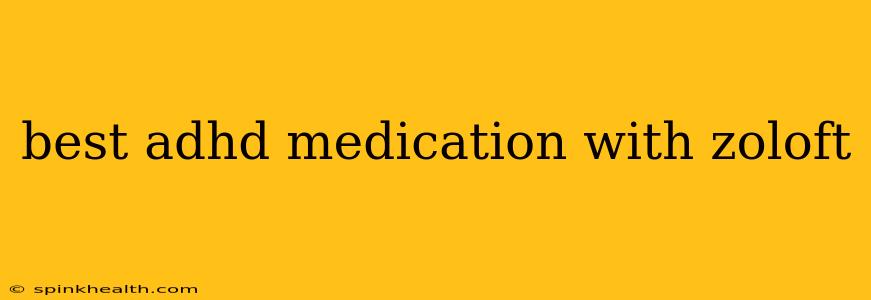Navigating the Complexities of ADHD Medication While Taking Zoloft: A Patient's Journey
The world of ADHD medication can feel like a labyrinth, especially when you're already managing another condition with medication like Zoloft. Finding the right ADHD medication while on Zoloft requires careful consideration, a collaborative approach with your doctor, and a healthy dose of patience. This isn't a one-size-fits-all scenario; what works wonders for one person might not be suitable for another. Let's unravel this together.
My own journey began with a diagnosis of both ADHD and depression. After starting Zoloft for my depression, I still struggled immensely with the core symptoms of ADHD: inattention, hyperactivity, and impulsivity. It felt like I was navigating life with the brakes on, but the car was still wildly out of control. My doctor and I embarked on a journey to find the right ADHD medication that wouldn't negatively interact with my Zoloft.
What are the common ADHD medications?
This is a question often asked by those newly diagnosed, and it's crucial to understand the landscape before embarking on treatment. The most commonly prescribed ADHD medications fall into two main categories: stimulants and non-stimulants.
-
Stimulants: These are often the first line of defense, known for their effectiveness in managing core ADHD symptoms. Examples include methylphenidate (Ritalin, Concerta) and amphetamine (Adderall, Vyvanse).
-
Non-stimulants: These are often prescribed for individuals who can't tolerate stimulants or experience significant side effects. Atomoxetine (Strattera) is a common non-stimulant option.
How do ADHD medications interact with Zoloft (Sertraline)?
This is where things get tricky. The interaction between ADHD medications and Zoloft isn't always straightforward. Some potential interactions include:
-
Increased or decreased effectiveness of either medication: This is a key concern, as the combined effects can be unpredictable. One medication might inadvertently enhance or diminish the impact of the other.
-
Increased risk of side effects: Combining medications can sometimes lead to a heightened risk of side effects, like increased anxiety, insomnia, or gastrointestinal issues.
-
Serotonin Syndrome (rare but serious): This is a potentially life-threatening condition that occurs when the body has too much serotonin. While rare, it’s crucial to monitor closely when combining medications that impact serotonin levels.
What ADHD medication is best with Zoloft? There's no single answer.
This is arguably the most important question, and unfortunately, there's no easy answer. The "best" medication is highly individual and depends on several factors:
-
Your specific symptoms: The severity and nature of your ADHD symptoms will influence which medication is most appropriate.
-
Your medical history: Pre-existing conditions, allergies, and past responses to medications all play a role.
-
Your response to treatment: This is a trial-and-error process. What works for one person might not work for another, and your doctor will likely need to adjust your medication based on your individual response.
What are the common side effects of ADHD medications when taken with Zoloft?
Common side effects of ADHD medications can include decreased appetite, insomnia, increased heart rate, and anxiety. When combined with Zoloft, these side effects can be amplified or altered. It’s vital to communicate any new or worsening side effects to your doctor promptly.
Can I take Zoloft and ADHD medication at the same time?
Yes, many people successfully manage both ADHD and depression by taking both Zoloft and an ADHD medication concurrently. However, it's crucial to do so under strict medical supervision. Your doctor will carefully monitor you for any adverse interactions or side effects.
What should I discuss with my doctor before starting ADHD medication while on Zoloft?
This is a conversation that should be comprehensive and thorough. Be prepared to discuss:
- Your complete medical history: Including allergies, other medications, and pre-existing conditions.
- Your current symptoms: Clearly describe your ADHD and depression symptoms.
- Your expectations for treatment: What are your hopes and concerns about medication?
- Your willingness to monitor for side effects: Accurate reporting of side effects is crucial for successful management.
The path to finding the right combination of medications is a journey, not a destination. Open communication with your doctor, meticulous monitoring of side effects, and patience are crucial to achieving success. Remember, your doctor is your partner in this process. Don't hesitate to express your concerns and work collaboratively to find the best treatment plan for you.

